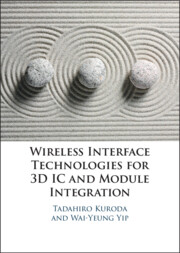1 - Introduction
3D Integration and Near-Field Coupling
Published online by Cambridge University Press: 17 September 2021
Summary
Chapter 1 starts by tracing the history of the computer, integrated circuit (IC), and connector in the last 60 years. In particular, it describes how the goal of IC development evolved from high-performance IC to low-power IC and interface, and then to high energy efficiency. This provides the background to help the reader understand current and future challenges faced by the IC and connector in addressing the diverging performance needs of various emerging applications. This in turn sets the stage for the introduction of 3D IC integration, which is evolving from low-cost wirebond to high-performance and high-density TSV-based solutions to offer More than Moore performance improvement. The challenges faced by 3D integration are then enumerated, and 2.5D integration and wireless interface technologies are presented as current and future solutions respectively. A brief overview of wireless technologies is then provided, followed by an explanation of why near-field coupling has been applied to develop two wireless interface technologies – ThruChip Interface (TCI) and Transmission Line Coupler (TLC). The chapter concludes with an overview of TCI and TLC and an elaboration of how they address respectively the challenges in 3D IC integration and connector performance scaling.
Keywords
Information
- Type
- Chapter
- Information
- Publisher: Cambridge University PressPrint publication year: 2021
